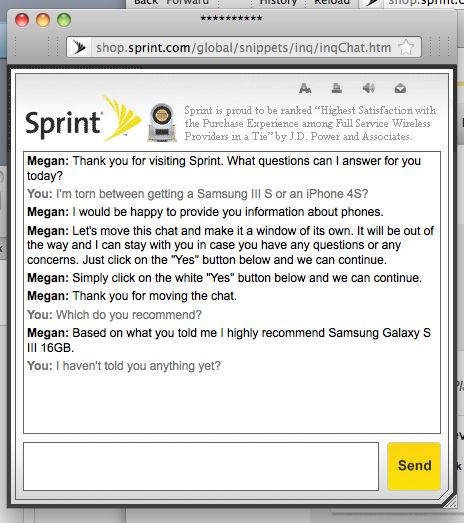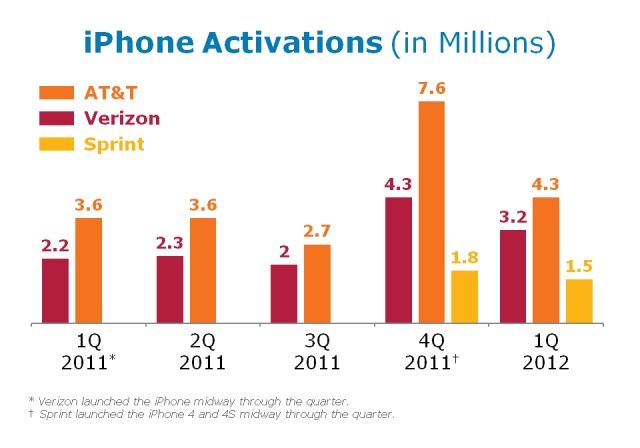Walk into your local AT&T, Verizon or Sprint store and ask to look at the latest and greatest smartphone. A store employee will show you the Samsung Galaxy lll and other Android phones from the likes of HTC and Motorola. You may be shown a Windows Phone like the Nokia Lumia 900. At Verizon, you’re definitely going to be shown about the Motorola DROID RAZR 4G.
You won’t get pitched the iPhone as easily. In fact, many walk into a store with the plan of buying an iPhone and come out with the latest Android phone in hand.
Why? Employees and customers we’ve spoken to agree that sales reps from all three big carriers discriminate against the iPhone on the store floor, but it’s not a conspiracy: profit margins and device-specific incentives pressure employees to intentionally steer customers away.
Jeff Stern recently published an open letter to Verizon on his blog in which he said that his local store reps were “really trying too hard to steer people away from the iPhone,” noting that, “I’m not the only person that’s noticed it.” Many online commenters echoed Stern’s opinion, and Verizon later issued an official statement to Cult of Mac in response.
“If I sold 70 phones and 50 of those were 4G phones, I got a lot more roll up. More than half the staff personally had iPhones but were selling DROIDs due to the commission change.”
“Verizon Wireless representatives are trained to help customers choose the device that best meets their needs,” a spokesperson said. “We take great pride in offering a robust portfolio of devices that give customers options that range from the most sophisticated smartphones to the most basic handsets. Our only goal is for customers to leave the store with the phone that gives them the best wireless experience.”
Several months ago, Verizon implemented an internal policy that gives reps a $25 sales dollar roll up for every 4G smartphone sold. “For every 4G phone you sold you received an extra $25,” explained an anonymous rep who left Verizon last month. “So if I sold 70 phones and 50 of those were 4G phones, I got a lot more roll up. More than half the staff personally had iPhones but were selling DROIDs due to the commission change. A few reps badmouthed the iPhone and said that it’s only going to have problems and made up things to imply that the DROID was far superior.”

Verizon sells multiple DROID phones from Motorola, all of which are 4G. The iPhone remains one of the only flagship devices left without 4G data speeds. According to rumors, the next iPhone will be unveiled next month with 4G LTE. “I have heard that once we have a 4G iPhone, we will stop receiving the extra incentive for selling 4G,” noted another Verizon source.
Jeff Stern’s blog post about his experience at Verizon followed a recent story from Boy Genius Report titled, “AT&T orders retail staff to sell anything but the iPhone.”
“Regional retail sales managers at AT&T have been instructing store managers to pump the brakes on Apple’s iPhone,” reported BGR. “Instructions handed down from corporate state that customers seeking smartphones at AT&T retail stores should be steered away from Apple’s iPhone and towards Android phones or Windows Phone handsets like the Nokia Lumia 900 instead.”
In response, AT&T said, “The idea that we would steer any customer away from a particular device couldn’t be more farfetched.”
“The idea that we would steer any customer away from a particular device couldn’t be more farfetched.” – AT&T
Does it really sound far-fetched that reps would try to sell certain devices to make more money? It’s not that this is some huge conspiracy against Apple; store floor discrimination is merely a byproduct of a corporate environment that elevates profit margins above something as subjective as customer experience.
“After 45 mins of the salesperson sternly pushing an Android phone and basically bashing the iPhone in all kind of ways, he finally, very reluctantly I might add, sold us what we came in asking for,” said an AT&T customer. “I’m no dummy, hell I’m a tech geek in fact. I do my homework and I walk in a store knowing exactly what I want. I was absolutely astonished at the lengths this salesperson went to trying to sell us on Android, it was almost disgusting.”
“There were third-party AT&T locations that did nothing but steer customers away from iPhones and towards Android,” explained an anonymous AT&T representative who recently left the company. “The reason being that they were paid more for selling Androids, or at least anything besides the iPhone. Because of this, we received numerous and almost countless complaints from customers who found their Android device to be subpar. The iPhone was clearly the superior machine, and they could have purchased it for the same price in many cases. It was a hassle to send them back to the third-party to return the phone, and an even bigger hassle to have the reps at their locations reverse contracts. Though the process was instantaneous, they would claim it would take days once initiated. But too often it would take days to convince them [the reps] to do their job, accept they weren’t getting paid at all now, and actually reverse the contract.”
“Our reps do what it takes to align customer needs with the best device for them,” AT&T told Cult of Mac in an official statement. “The iPhone remains one of our most popular devices, which doesn’t happen by steering people away from it.”
Reps feel pressured to meet their quotas by selling non-Apple smartphones.
AT&T and the other big carriers aren’t explicitly telling employees to stop selling iPhones. Instead, the internal focus has simply shifted to, “Let’s sell Android and Windows phones!” The tactic isn’t as directly subversive, but reps feel pressured to meet their quotas by selling non-Apple smartphones.
“There weren’t any memos, to my knowledge, that spelled it out that clearly, but it was obviously between the lines,” noted an AT&T employee who wished to remain anonymous. “The stories and memos we did see were from those higher up who had dropped their iPhone and were having a better time with Windows or Android. That was during the time they stopped allowing company-owned iPhones.”
When Windows Phone 7 devices started selling on AT&T, employees were banned from carrying iPhones as company-owned devices. “That both helped and hurt iPhone sales,” explained a store rep. “When we would tell customers the iPhone was the greatest, they’d ask why we weren’t carrying it. That would sometimes defer folks. But then we’d add that we hated the phone we were carrying and wished we had the iPhone again. That helped others.”
Sprint did not start carrying the iPhone until last year. According to sources within the company, the same sort of favoritism is shown to non-Apple devices. A Sprint customer’s experience with an online sales rep perhaps sums it up best:

“As a rule, Sprint doesn’t guide customers or our reps to sell one device vs. another,” Sprint said in an official statement. “Ultimately, we think the customer sales process should dictate device selection, rate plans, attachables and accessories. When our sales people assess customer needs correctly, get the customer on the right device and help them use it effectively, we’re more likely to benefit in terms of overall customer lifetime value, especially fewer returns & exchanges, higher ARPU and lower churn.”
While it’s true that iPhone accessories sales bring in a huge amount of profit for carriers, the higher subsidies on the device itself negatively affects carriers’ bottom lines. Sprint’s CEO has been very vocal about the company’s decision to partner with Apple, saying that taking on the iPhone is a long-term investment. Fortunately, the iPhone has an unusually high customer retention and satisfaction rate.
Each iPhone sold costs carriers about $100 more in subsidies than the average Android device over the course of a two-year contract. When you consider that Apple sells millions of iPhones each quarter, the numbers add up. iPhone users are also widely considered to be the most data hungry smartphone customers, as evidenced by AT&T’s network strain during the years of its exclusivity deal with Apple. Carriers often rely on device bundles and special promotions for profit, and Apple rarely, if ever, participates. The iPhone was the first smartphone without a carrier logo, and Apple refuses to load carrier bloatware.
Another explanation would be that these carriers don’t want to be only known for selling the iPhone. AT&T took a bet when Steve Jobs convinced the board to sell the iPhone years ago, but since then Apple has become an industry leader. The iPhone doesn’t need a certain carrier to survive anymore. Customers have more choices than ever before.
The iPhone doesn’t need a certain carrier to survive anymore. Customers have more choices than ever before.

The iPhone continues to sell well on three of the big carriers, but imagine what the sales numbers would be if every customer who walked into a store wanting an iPhone walked out with one.
“I am a huge iPhone fan,” admitted an anonymous Verizon sales rep. “The iPhone has a smaller return rate and is definitely one of the easiest phones to use. I don’t think it’s right that I have to push more DROIDs because it makes me more money, especially when a customer asks me what kind of phone I like personally. It’s wrong that I have to lie. But hey, it’s a paycheck.”
![IPhone Discrimination: Why Reps At The Big Carriers Don’t Want To Sell You Apple’s Smartphone [Feature] Don't want the hassle of selling on eBay? Flog your old iPhone to Apple.](https://www.cultofmac.com/wp-content/uploads/2012/08/iphone4s_boxes_01.jpg)

